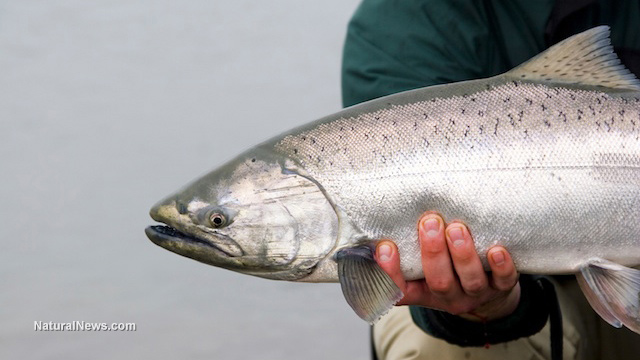 California governor bans commercial GM salmon production
California governor bans commercial GM salmon production(NaturalNews) At the end of September, California Governor Jerry Brown signed a ban on commercial production of genetically modified (GM) salmon anywhere in the state, in a move hailed by the Center for Food Safety (CFS) as an important step in the right direction -- but one that leaves a dangerous loophole.
AquaBounty Technologies has inserted genes from eelpout and Pacific Chinook salmon into Atlantic salmon (the variety of salmon that is widely farmed) in order to make the farmed fish produce abnormal quantities of growth hormone and grow up to six times faster. The company is currently seeking FDA approval to market GM salmon in the United States.
Almost 2 million people have submitted comments opposing the fish's approval, spurring several major retailers including Kroger, Safeway and Target to pledge not to carry GM seafood in their stores.
No freshwater or ocean cultivation
The California law, AB 504, was authored by Wes Chesbro, D-Arcata, in order to protect the state's native populations of salmon and steelhead trout, a closely related species. The law was also supported by the Pacific Coast Federation of Fishermen's Associations.
"If these 'frankenfish' were to escape into our waters, they could destroy our native salmonid populations through interbreeding, competition for food and the introduction of parasites and disease," Chesbro said. "The only way to ensure this never happens is to ban commercial hatchery production, cultivation or stocking of transgenic salmonids in
California."
Under the new law, no cultivation or spawning of "transgenic salmonids" will be permitted in any of California's fresh or Pacific waters. Even research into GM salmonids is prohibited, if it is intended for commercial purposes.
"California has taken an important step to protect its native
salmon and trout stocks. Genetically engineered salmon pose a serious risk to our waterways and our native fish populations," said Rebecca Spector, West Coast Director of the CFS.
Dangerous fish, dangerous loophole
But the CFS has warned that the law still allows non-commercial GM fish research to take place in California. This makes the ban easy to bypass, they warned.
"The research exemption sounds reasonable, but many of the scientists working on GE salmon and trout already have contracts with the companies that want to commercialize GE
fish," said CFS Senior Policy Analyst Jaydee Hanson. "The provision basically allows for corporations to continue their efforts to commercialize GE fish, undermining the intent of the ban."
In addition, any GM fish cultivation in California could place native species at risk, Hanson warned.
"The expanded law unfortunately allows researchers to grow genetically engineered salmon and trout in tanks that could be located right next to waterways containing the wild variety of the species being engineered," Hanson said. "Similar breeding tanks have been wiped out by storms allowing fish to escape."
According to the Fish and Wildlife Service, "history dictates that fish held in aquaculture facilities either land- or water-based, escape."
Scientists have warned that GM fish would exacerbate the problems already cause by mixing of farmed fish with their wild relatives. That's because, in the short term, fast-growing farmed fish crowd out wild fish.
For example, a 2008 study in the journal
PLOS Biology found that, when wild fish and hatchery-bred fish mixed, the abundance of wild fish fell by 50 percent. A 2009 study in
Science found that, when wild steelhead trout bred with farmed steelheads, their offspring no longer reproduced at levels sufficient to sustain a wild population.
"If transgenic fish become established in natural stocks," said researcher Fredrik Sundstrom of the University of Gothenburg, Sweden, "they would be able to out-compete the natural breeds."
Over the long term, farmed (or GM) fish could not survive in the wild. But by then, the wild fish may already be gone.
http://www.naturalnews.com/047628_GM_salmon_GMO_ban_California.html